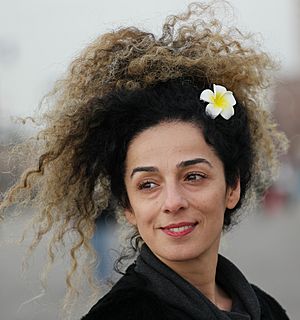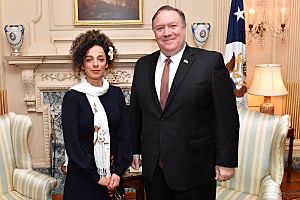Masih Alinejad facts for kids
Quick facts for kids
Masih Alinejad
|
|
|---|---|
| مسیح علی نژاد | |

Alinejad in 2018
|
|
| Born |
Masoumeh Alinejad-Ghomikolayi
September 11, 1976 Qomi Kola, Babol, Imperial State of Iran
|
| Nationality | Iranian |
| Citizenship | United States |
| Education | Oxford Brookes University |
| Occupation | Journalist and author |
| Years active | 2001–present |
| Employer | U.S. Agency for Global Media |
| Spouse(s) |
Max Lotfi
(divorced)Kambiz Forouhar
(m. 2014) |
| Children | 1 |
Masih Alinejad (Persian: مسیح علینژاد, born Masoumeh Alinejad-Ghomikolayi (Persian: معصومه علینژاد قمیکُلایی), September 11, 1976) is an Iranian-American journalist, author, and women's rights activist. She works as a presenter and producer for Voice of America Persian News Network. She also writes for Radio Farda and IranWire.
Alinejad focuses on speaking out about human rights in Iran, especially the rights of women. Time magazine recognized her as one of its Women of the Year in 2023. She lives outside of Iran in New York City. She has received several awards for her work, including the 2015 Geneva Summit for Human Rights and Democracy women's rights award.
In 2018, she published a book called The Wind in My Hair. In this book, she shares her experiences growing up in Iran. She wrote that girls there "are raised to keep their heads low, to be as quiet as possible, and to be meek." Because of her activism, she has faced serious threats. In 2019, Alinejad took legal action against the Iranian government in a U.S. court.
Contents
Early Life and Start in Journalism
Masih Alinejad was born as Masoumeh Alinejad. She chose to use the first name "Masih," which means "anointed" or "Messiah" in Persian. From a young age, she was interested in politics. In 1994, she was arrested for creating flyers that shared ideas the government didn't like.
Alinejad began her career in journalism in 2001. She first worked for a local newspaper called Hambastegi. Later, she wrote for the Iranian Labour News Agency (ILNA). Her articles also appeared in other newspapers like Shargh and Bahar. She worked as a reporter covering the Iranian parliament.
In 2005, she wrote an article that caused a lot of discussion. She reported that government ministers were getting large "bonuses" for various reasons, even though they claimed to have taken pay cuts. This article led to her being removed from her job as a parliamentary reporter.
In 2008, Alinejad wrote another article called "Song of the Dolphins." In this piece, she compared the followers of then-President Mahmoud Ahmadinejad to hungry dolphins. She suggested they would perform tricks to get food from their trainer. This comparison made some of Ahmadinejad's supporters very upset. The newspaper's director, Mehdi Karroubi, had to apologize publicly.
In 2009, while in the United States, Alinejad tried to interview Barack Obama, who was the U.S. President at the time. She was not able to get the interview. When her visa ended, she had to go back to the United Kingdom. While in the U.S., she joined some protests against the Iranian government. She gave a speech in San Francisco, telling the Iranian authorities, "We have trembled for thirty years, now it is your turn to tremble." She also made videos called "A Storm of Fresh Air," which were shown on Voice of America. In 2010, she helped start the "IranNeda" foundation with other Iranian writers. She also published a book called A Green Date.
Alinejad studied Communications Studies and earned a degree from Oxford Brookes University.
Her Work and Activism
Speaking Out Against the Iranian Government
In 2014, Alinejad started a Facebook page called My Stealthy Freedom. On this page, Iranian women were invited to share pictures of themselves without a hijab (headscarf). The page quickly became very popular around the world.
In 2015, the Geneva Summit for Human Rights and Democracy gave her a women's rights award. They recognized her for "giving a voice to the voiceless" and helping people understand the fight of Iranian women for basic human rights and equality. In June 2022, she received the Moral Courage Award from the American Jewish Committee. This award honored her for bravely supporting the Iranian people who are facing hardship from their government.
Alinejad has stated that she is not against the hijab itself. However, she believes that wearing it should be a personal choice. In Iran, women who appear in public without a hijab can be arrested, put in prison, or fined.
Her Journalism Work
Masih Alinejad has hosted a weekly show called Tablet for Voice of America's Persian Language Service since 2015. This 15-minute show features videos from inside Iran. It connects ordinary Iranian citizens with Americans through short interviews. The show also includes a weekly report that tracks important issues, like the women's rights movement.
In July 2019, Iranian authorities warned the public. They said that anyone sending videos to Alinejad could face up to 10 years in prison. The head of Tehran's Revolutionary Court stated that sharing protest videos with Alinejad could be seen as cooperating with an enemy of the state.
Campaign Against Mandatory Hijab
Alinejad has strongly criticized Iran's laws that make it illegal for women not to wear a hijab outside their homes. She believes the hijab is a very clear symbol of women's oppression in Iran. Even from her home in Brooklyn, she has led campaigns against the mandatory veil.
From 2012 to 2019, Alinejad created several campaigns to support the anti-mandatory hijab movement in Iran. These included #WhiteWednesdays, #MyCameraIsMyWeapon, and #MenWithHijab.
Some people who support women's rights have backed Alinejad's campaign. They see the Islamic veil as a key example of how women are treated unfairly in some Muslim countries. However, some other groups have criticized the campaign. They worry it might support negative ideas about Muslim women or increase negative feelings towards Islam.
Alinejad says she is not against Islam. She states that it is the religious laws (Sharia) that concern her. She believes that strict religious rules are a main cause of negative views about Islam. During a discussion on CNN, Alinejad said that if you care about human rights, you should not use the hijab as a symbol of resistance in the United States. This is because it is seen as a symbol of oppression in the Middle East.
After the Christchurch mosque shootings in New Zealand in March 2019, Alinejad criticized New Zealand's Prime Minister, Jacinda Ardern. Ardern wore a hijab to show support for the Muslim victims. Alinejad felt that using the hijab, which is a symbol of oppression for many Muslim women, for solidarity was upsetting.
Chess Championship Boycott
In 2016, Alinejad started a campaign to boycott the 2017 women's chess world championship. This event was planned to be held in Tehran, Iran. The campaign began when Nazí Paikidze, a chess player from Georgia and America, refused to go. Paikidze did not want to attend because, under Iran's religious law, female players would have to wear a hijab. Alinejad supported Paikidze and wrote an article with Asra Nomani in The Washington Post about it.
Living in the U.S.
Alinejad moved from London to New York City in 2014 and became a permanent resident in the United States. She became an American citizen in October 2019.
Meeting with U.S. Secretary of State
In February 2019, Masih Alinejad met with U.S. Secretary of State Mike Pompeo. A spokesperson for the U.S. State Department said that Secretary Pompeo "thanked Ms. Alinejad for her bravery and continued dedication." Alinejad stated that their meeting lasted 35 minutes. She discussed three main points:
- Many Iranians want the current government to change, and their voices should be heard.
- The world should focus on the human rights issues in Iran over the past 40 years.
- The U.S. travel ban at the time was hurting human rights activists and students, not the government.
Women, Life, Freedom Movement
During the Mahsa Amini protests in Iran, there was an internet shutdown. This made it hard for protesters to communicate. After this, several important Iranian figures living outside the country formed a group. This group included Reza Pahlavi, Crown Prince of Iran, soccer player Ali Karimi, dentist Hamed Esmaeilion, and Masih Alinejad. They used media outlets like BBC and Iran International to share their message and help lead the movement.
The protests continued for several months. Later, the group they formed also broke apart. Alinejad was a guest speaker on a podcast called “The Iran Breakdown,” where she discussed the "Women, Life, Freedom" movement.
In response to events in June 2025, Alinejad stated that removing a terrorist is a step towards justice for those whose lives were harmed.
Awards and Recognition
Awards She Has Received
- AIB Media Excellence Award for Radio Farda's "Victims of 88" (November 2013)
- First Women's Rights Award at the Geneva Summit for Human Rights and Democracy (2015)
- Freethinker Prize by Swiss Freethinkers Association (2017)
- America Abroad Media award (November 2019)
- Moral Courage Award by American Jewish Committee (AJC) (June 2022)
- Oxi Courage Award for her fight against Iran's mandatory hijab (October 2022)
- Scholar-Statesman Award by Washington Institute for Near East Policy for promoting women's rights and change in Iran (November 2022)
- Global Impact Award (December 2022)
- Transatlantic Leadership Network "Freedom of the Media" Gold Medal (2024)
Other Recognitions
- Nominated for the Nobel Peace Prize for her work on women's rights in Iran (2022)
- Named one of Time Magazine's 12 Women of the Year (March 2023)
Books She Has Written
Alinejad's book, The Wind in My Hair ISBN: 9780349008967, was published in 2018. It tells the story of her journey from a small village in northern Iran to becoming a journalist and starting an online movement. The New York Times said the book gives a clear picture of modern Iran and is written with "blunt honesty."
She has also published four books in Persian:
- Tahasson – This book describes the political challenges that happened when the "Sixth Iranian Parliament" went on strike.
- Taj-e-Khar (The Crown of Thorns) – This is a novel that is being translated into English. It refers to the crown of thorns placed on Christ's head.
- I am Free – This book talks about women's issues in Iran. It was published in Germany because Iran's censorship body, the Islamic Culture and Guidance Ministry, did not allow it to be published in Iran.
- Gharar Sabz (Green Rendezvous) – This book is about the violence that followed the 2009 presidential election in Iran. This book was also published in Germany for the same reasons.
See also
 In Spanish: Masih Alinejad para niños
In Spanish: Masih Alinejad para niños
- Guardianship of the Islamic Jurist
- Islamic Revolution
- Theocracy




